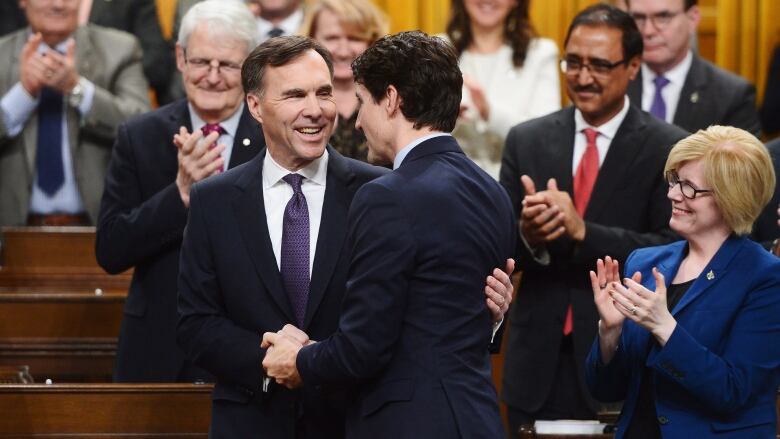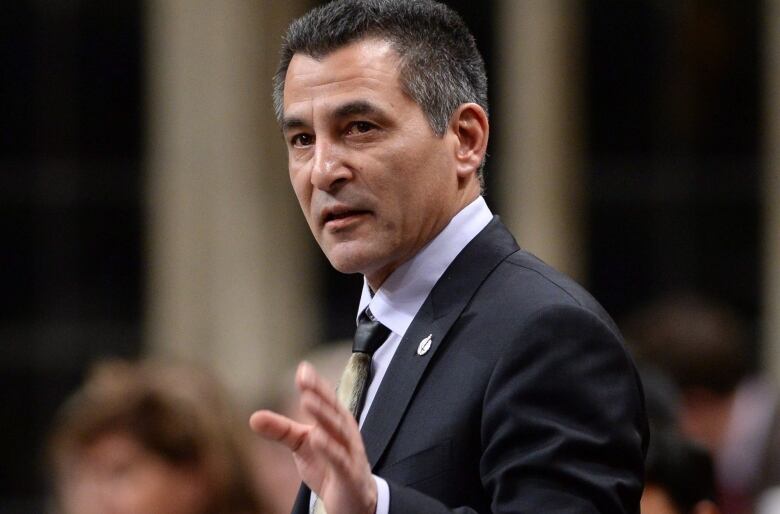Federal budget earns high marks from Inuit leaders, with caveats
Government's approach to Inuit priorities hailed, but MP says Nutrition North program left unaddressed

The 2018 federal budget is being praised as a "game changer" by Inuit leaders, but Nunavut's MP is saying that food security, in particular the much-maligned Nutrition North program, stands foremost among glaring issues left unaddressed.
For the first time, the budget included a specific section dedicated to Inuit priorities. That included a 10-year, $400 million commitment toward housing in Nunavik, Nunatsiavut, and the Inuvialuit settlement area, $27.5 million over five years to eliminate tuberculosis in Inuit Nunangat, and $82 million over 10 years for the creation of a permanent Inuit health survey.
The additions werewelcomed by Inuit Tapiriit Kanatami president Natan Obed, who highlighted the government's commitment to havethe money flow through Inuit organizations in Inuit Nunangat.

"That is a game changer, if you will, for self determination," he said. "In previous budgets, we would have to guess where we might fit or not fit in First Nations specific funding announcements, or in general Canadian announcements."
Nunavut MP Hunter Tootoo also praised the approach.
"I know that's something where the government wants to go," he said. "I was in Montreal yesterday at the Hudson Bay Summit and one of the things that Natan said, and I said, was the government needs to get out of the way. And if this is a way that things can flow more quickly or more efficiently, I think that's a good thing."
However, Tootoocriticized the omission of any new funding or changes for theNutrition North program. Nutrition North was promised $64.5 million over five years in the 2016 federal budget. The government also pledged money that year to expand the program to all isolated Northern communities.
Despite the pledged funds two years ago, thefood subsidy program has been criticized by Northern residents, who have said the program failsto make healthy food affordable and is not helping those who need it most.
- Amazon Prime does more for northern food security than federal subsidies, say Iqaluit residents
- Feds lay out issues Northerners have with Nutrition North in new report
"I am rather disappointed that there was no funding for Nutrition North," Tootoo said. "It's just somethingthat affects every single person in Nunavut. So I am rather disappointed that there isn't anything in there, given that they committed to fixing the program."
Tootoo said food security was his "number one" issue he hoped to see addressed in the budget, and that he expected to see funds after speaking to ministers and other colleagues over the past year. He said that he would follow up on the issue "the next opportunity I have in the House."

'We're not talking about millions of people here'
However, Tootoo offered praise for the budget's inclusion of money for Inuit skills development and training, as well as eliminating tuberculosis in Inuit Nunangat. The disease has been prevalent among communities in Nunavut, despite being largely eliminated in much of the developed world.
- 'People are afraid to come near us': Stigma follows Qikiqtarjuaq, Nunavut, residents after major TB screenings
- Fighting tuberculosis in Nunavut means addressing much more than just the disease
The government pledged to work towardeliminating the disease in conjunction with a task group created by Inuit TapiriitKanatami and the federal government. Obedsaid the group has had two meetings since being announced in December and is currently developing a strategy to fight and eventually eliminate the disease.
"We're not talking about millions of people here," he said. "There are only 65,000 in Inuit Nunangat. So surely, in this country, we can find ways to provide services in a blanketing approach, and then also work on social determinants as well."
Obed highlighted a multi-pronged approach to fight tuberculosis, focusing on community outreach, awareness, and addressing root causes of poor healthsuch as food and housing security, though he stressed the group had not yet finalized details.
"I'm confident we can eliminate tuberculosis," he said. "I'm confident in Minister [of Indigenous Services] Philpott's approach, and also her commitment."
With files from Nick Murray, Kieran Oudshoorn












_(720p).jpg)


 OFFICIAL HD MUSIC VIDEO.jpg)
.jpg)



























































































